Client portals are becoming popular due to their potential to improve client management, secure information sharing, and encourage collaboration. SMBs and remote workers are fans of this emerging technology due to customization, brand consistency, and cost efficiency. Fortunately, some providers offer free client portal software to attract more platform users.
What is a Client Portal Software?
A client portal is a centralized hub that allows businesses to interact and share information with their customers. It provides a secure and personalized space to receive and share documents, feedback, and communication. Most SMBs use these platforms to facilitate remote work.
Client portals are either a part of a more comprehensive business software suite or ship as a standalone product. These standalone options offer more customizability and advanced features like embedding, analytics, task coordination, and knowledge base management.
Business owners often use these products to improve client experience, protect customer data, build personalized websites, and more. These portal software hubs allow customers to access sensitive data behind a password-protected wall.
Top Free Client Portal Software in 2024
Check out our list of the top free client portal software that you can use.
1. Ahsuite
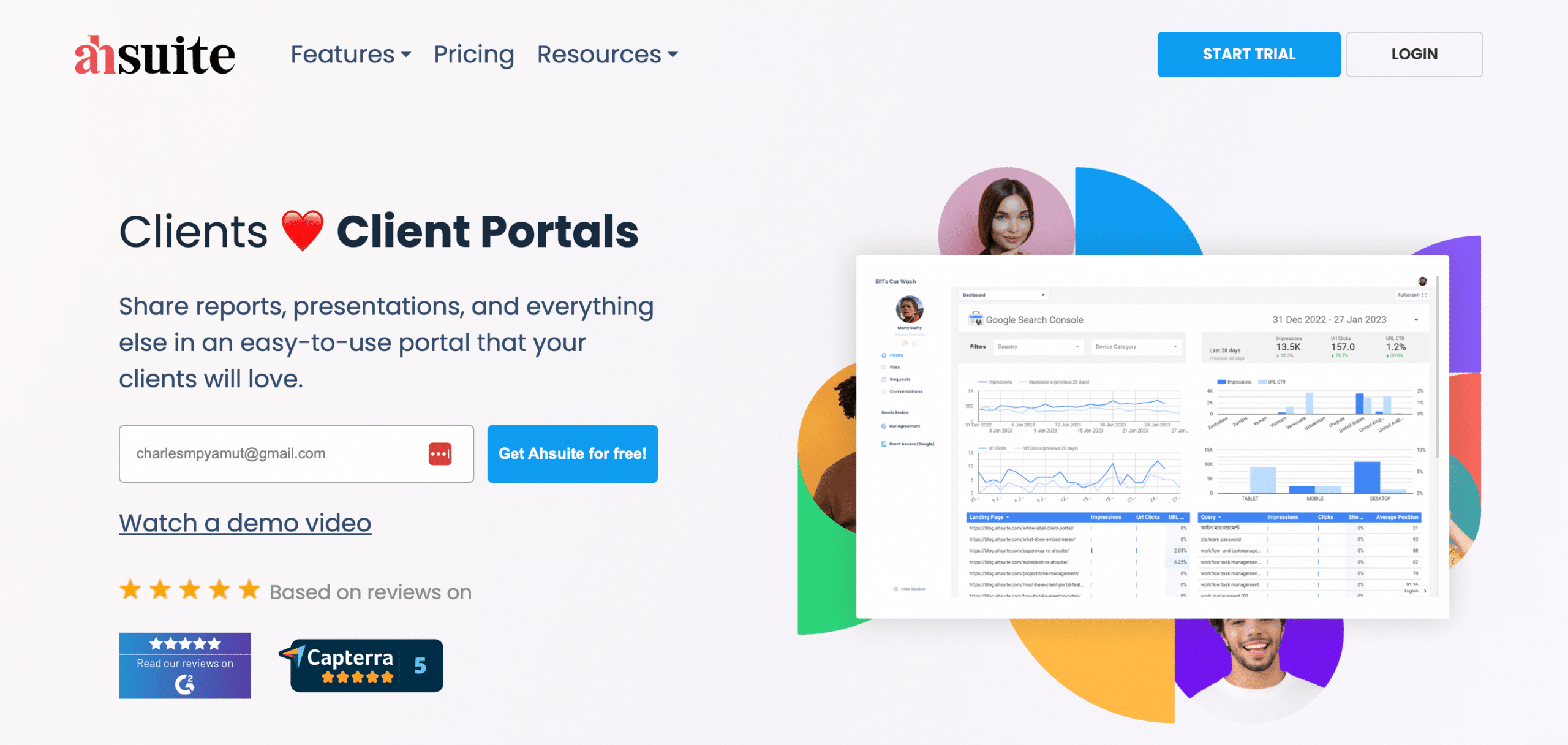
Designed for digital agencies, freelancers, and educators alike, Ahsuite is an excellent choice for anyone navigating the online client-centric realm. Its core purpose is to deliver a secure, organized, and smooth experience during online client interactions.
Users can embed anything, from Figma boards to videos and dashboards, in a secure portal. Clients only see the information they need to see, which avoids cluttered workspace. Its minimalistic style mitigates additional administrative jobs and the need to send links via email.
With tools like a team password manager, work journals, and robust task management, Ahsuite facilitates a smooth team collaboration and client onboarding experience. It even offers a unique feature – users can recruit or get hired within the Ahsuite community.
Pros:
- Sleek and intuitive design.
- Masterful task management.
- Versatile embedding options.
- Connect with job prospects.
- Streamlines client communication.
Cons:
- Limited client view customization.
- Potential for expanded in-app sections.
- Document management requires improvements.
- Absence of Google Drive/One Drive support.
Pricing:
- Free Version
- Professional: $24
- Agency: $57
Customer Ratings:
- G2: 4.8 out 5 (56 reviews)
- Capterra: 4.9 out 5 (19 reviews)
2. SuiteDash
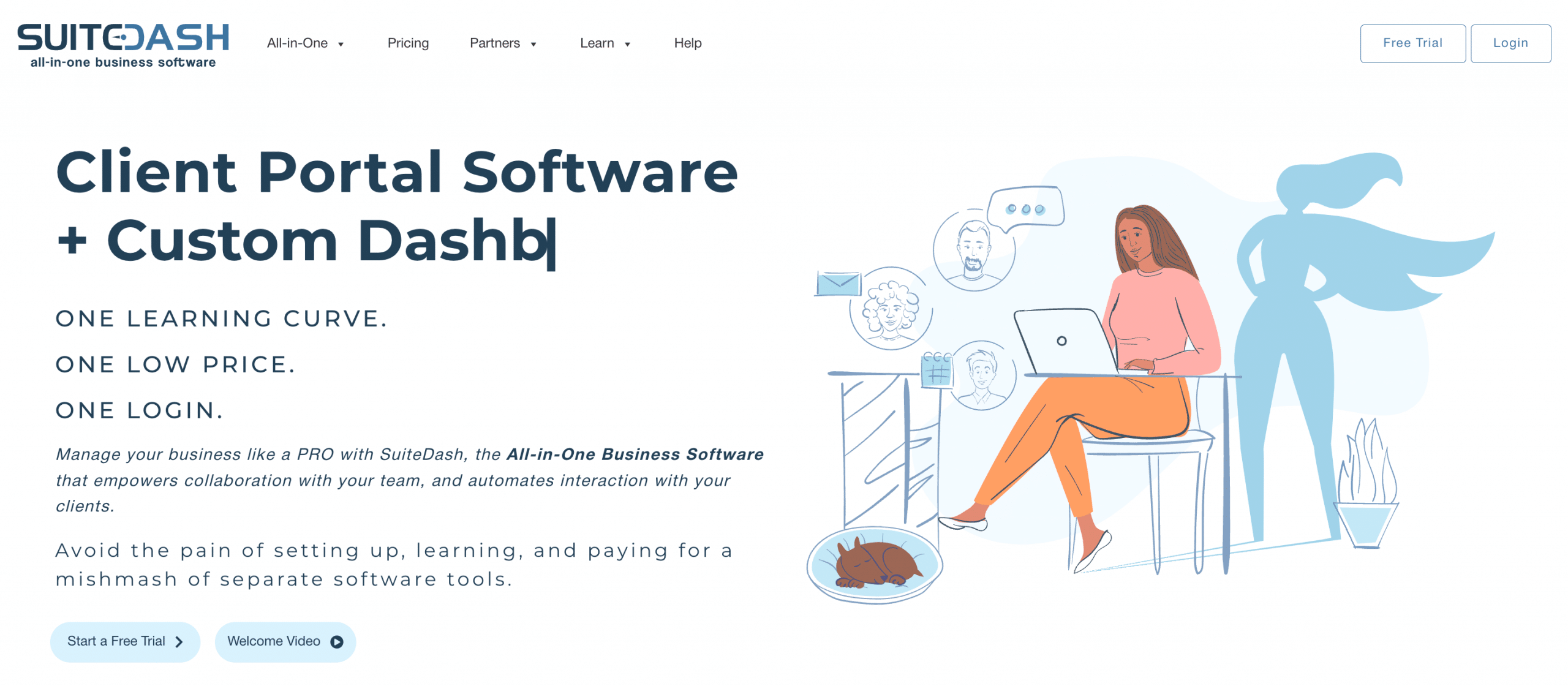
SuiteDash is the go-to for small to medium-sized businesses who want to provide a fully branded experience. Beyond just a client dashboard, it fuses project management, CRM, file sharing, and more, eradicating the need to juggle multiple platforms.
Imagine having a Swiss Army knife for business management that can be suited for many organizations. The platform’s all-in-one approach and block editor interface give organizations of all sizes the flexibility they need in their industries.
Pros:
- Users can create invoices and share files with clients.
- Single platform for varied tasks.
- Quick and effective customer support.
- Centralizes business operations.
- Offers customizable branding options.
Cons:
- Overwhelming feature set for newcomers.
- New users experience slow feature rollouts.
- Requires familiarization with interconnected modules.
- It might need continuous adjustments.
Pricing:
- Free Trial (14 days)
- Start: $19
- Thrive: $49
- Pinnacle: $99
Customer Ratings:
- G2: 4.8 out 5 (515 reviews)
- Capterra: 4.8 out 5 (521 reviews)
Related: 10 Best SuiteDash Alternatives
3. Accelo
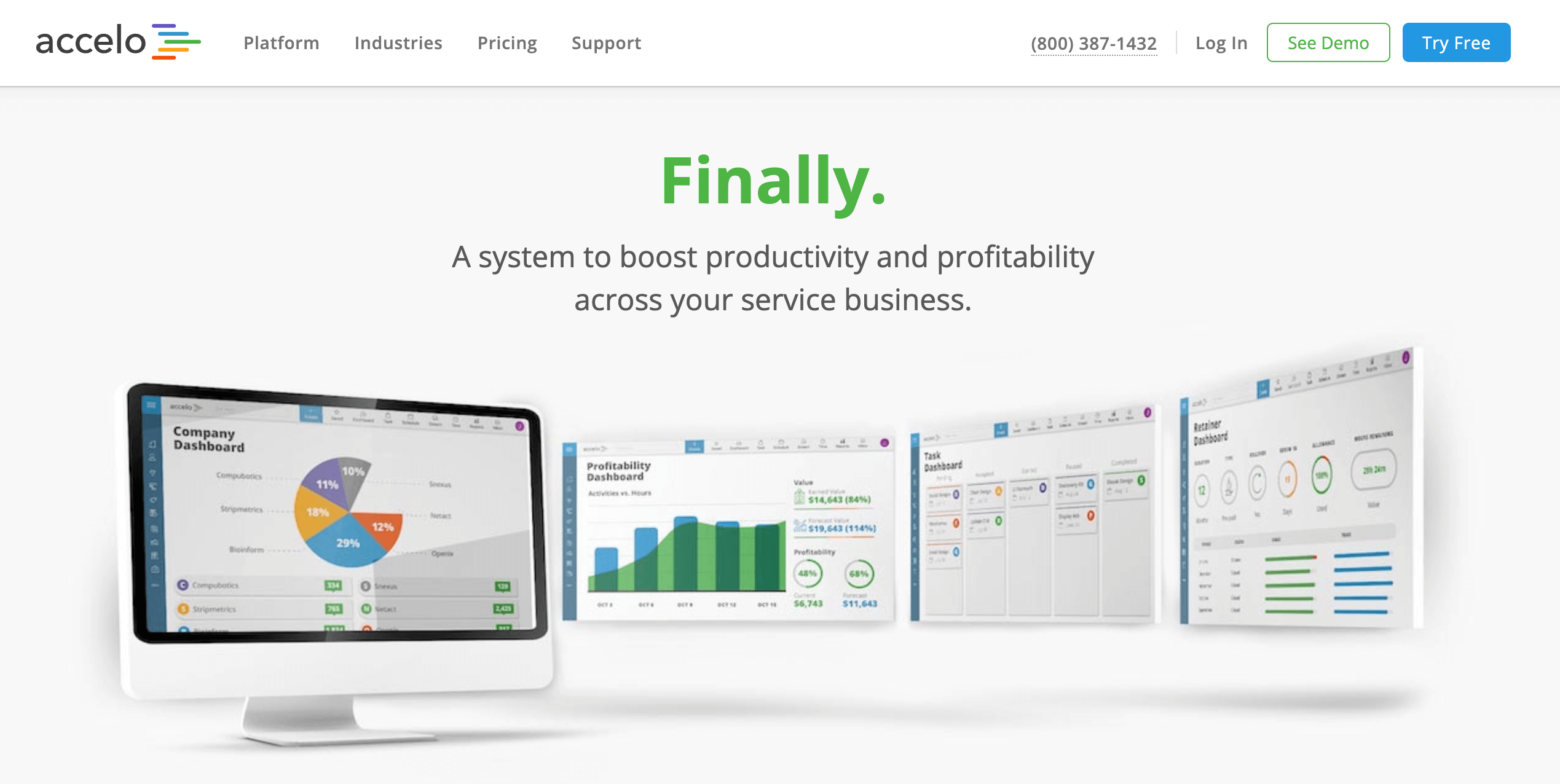
Tailored for businesses keen on eliminating project uncertainties, Accelo offers insight into every project’s heartbeat. This software paves the way for deeper client understanding and strategic business expansion by harmonizing aspects like sales, billing, and analytics.
Accelo ensures sales practices remain consistent, unearthing missed opportunities while bolstering team cohesion. With real-time project statuses, businesses can assure timely and budget-aligned deliveries.
Pros:
- Seamless front-to-back automation.
- Detailed project plans work hand in hand with sales.
- Has a robust mobile application available.
- Syncs with popular platforms like Xero.
Cons:
- Offers lots of features but stretches too thin in some areas.
- Overly detailed info can complicate client reports.
- Occasional quality update issues.
- Customer experience needs improvement.
Pricing:
- Free Trial (7 days)
- Core: $60
- Professional: $250
- Business: $350
- Advanced: $900
- Elite: $1,900
Customer Ratings:
- G2: 4.4 out 5 (492 reviews)
- Capterra: 4.5 out 5 (165 reviews)
Related: 10 Best Accelo Alternatives
4. Zoho CRM
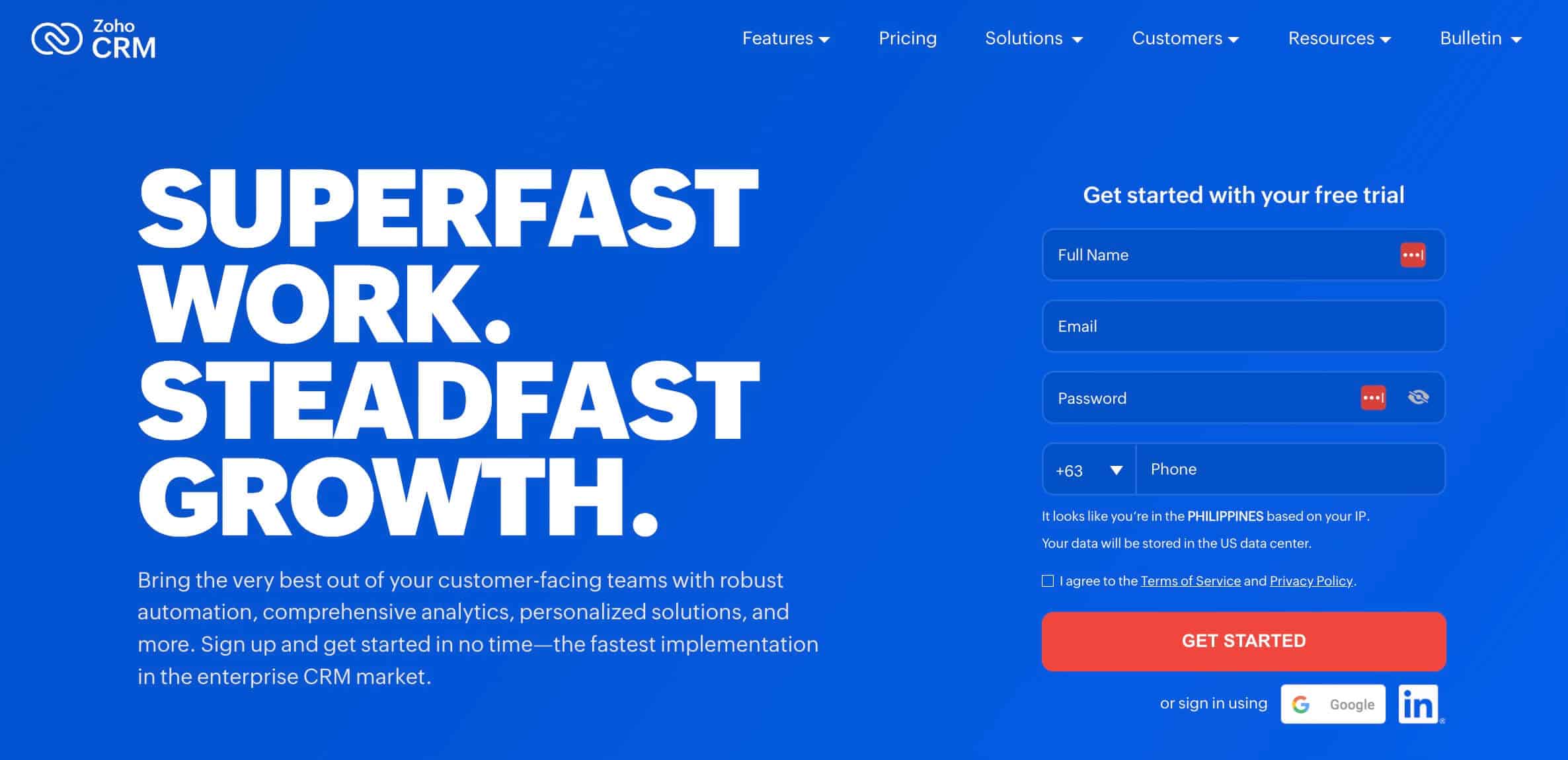
SMBs and professionals use Zoho CRM to simplify customer relationship management. Although primarily a CRM, it offers sales funnels, client portals, and AI-powered conversational assistance.
It offers free tools for email marketing, automation, analytics, and customization in a limited capacity, perfect for small teams. Only the first portal user type is free, and only for the Contacts module. You must purchase other portals for leads, vendors, and custom modules.
Pros:
- Straightforward deployment and automation.
- Integrates with most business solutions.
- Has mobile accessibility and email centralization.
- Impressive report generation capabilities.
- Competitive pricing with expansive features.
Cons:
- Custom functions programming limitations.
- Has issues with document merge fonts.
- The user interface can be frustrating.
- External connections have their limits.
- The software complexity can be overwhelming for some.
Pricing:
- Free Version
- Standard: $20
- Professional: $35
- Enterprise: $50
- Ultimate: $65
Customer Ratings:
- G2: 4.0 out 5 (2512 reviews)
- Capterra: 4.3 out 5 (6610 reviews)
Related: 10 Best Zoho CRM Alternatives
5. Copilot

Copilot is primarily designed to manage the intricate operation of service businesses. As a comprehensive business solution, you can bring your communication, payments, file management, and contracts within a single platform.
In addition, Copilot offers modularity in features, allowing businesses to expand functionalities. They offer a 14-day free trial per plan basis, including their enterprise options.
Pros:
- Sleek and intuitive interface.
- Offers excellent customer service.
- Easy to navigate with non-tech savvy clients.
- Flexible white-label customization.
Cons:
- Some users suggest feature improvements.
- Pricing concerns for a few users.
Pricing:
- Free Trial (14 days)
- Starter: $39
- Professional: $89
- Advanced: $139
- Supersonic: $1,500
Customer Ratings:
- G2: 4.8 out 5 (122 reviews)
- Capterra: 4.9 out 5 (19 reviews)
Related: 10 Best Copilot Alternatives
6. Softr
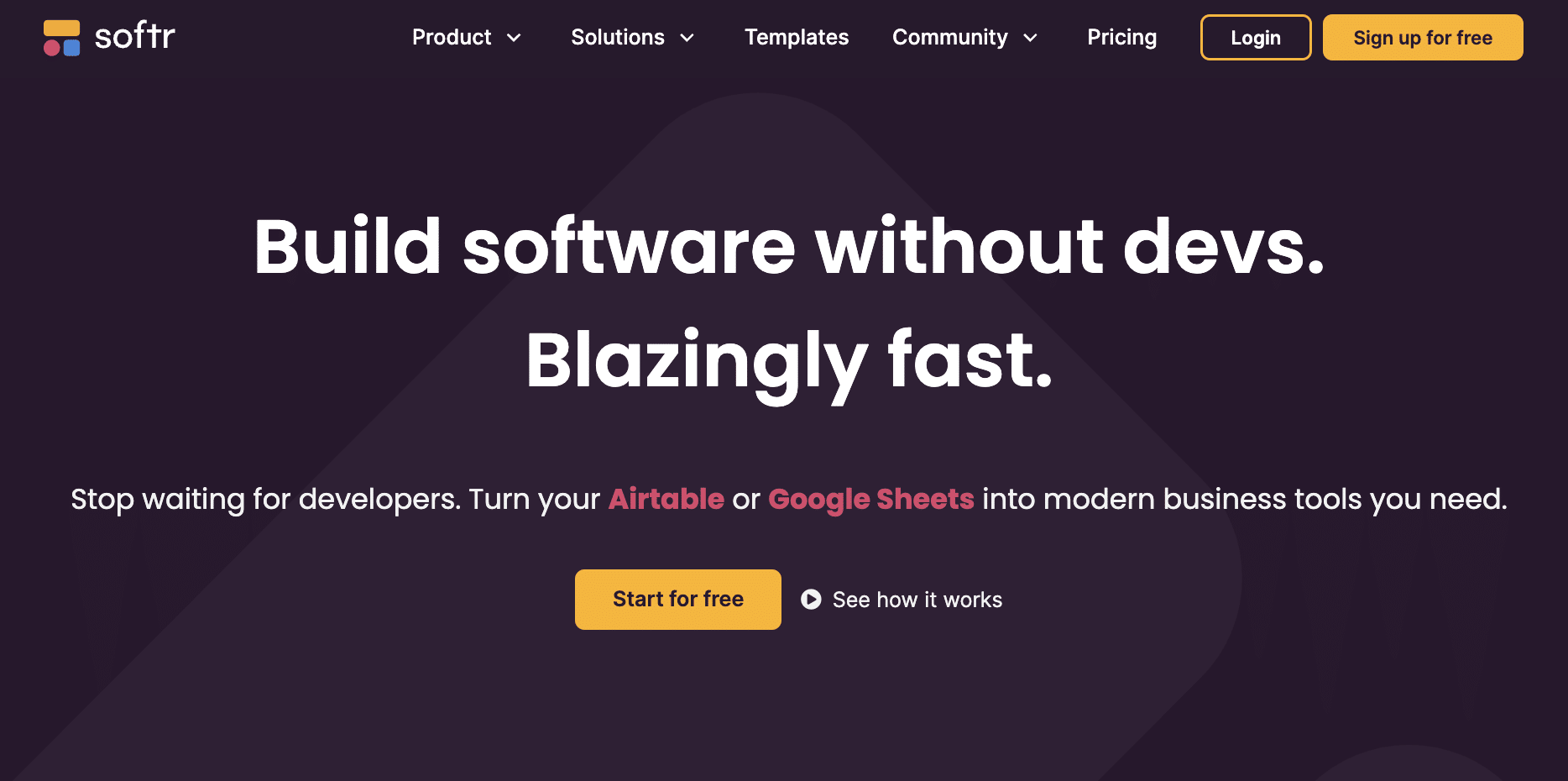
Designed for businesses that seek swift web app creation, Softr turns Google Sheets or Airtable into dynamic tools, directories, and more. With the promise of a functional web app in 10 minutes, it’s a blend of simplicity, power, and the agility of no-code solutions.
Users can easily create custom online solutions using pre-built components without requiring coding skills. It offers payment support and pre-built templates (including knowledge base templates) for easy creation.
Pros
- Directly syncs with the Airtable database.
- Comprehensive and visually appealing interface.
- Great tool for designers / non-technical users.
- Pre-built templates are great for quick solutions.
Cons:
- Features can occasionally bug out.
- Limited customization in the block editor.
- Autosave might glitch during updates.
- Performance can be sluggish at times.
Pricing:
- Free Version
- Basic: $59
- Professional: $167
- Business: $323
- Enterprise: Contact Sales
Customer Ratings:
- G2: 4.8 out 5 (293 reviews)
- Capterra: 4.7 out 5 (57 reviews)
Related: 9 Best Softr Alternatives
7. Moxo
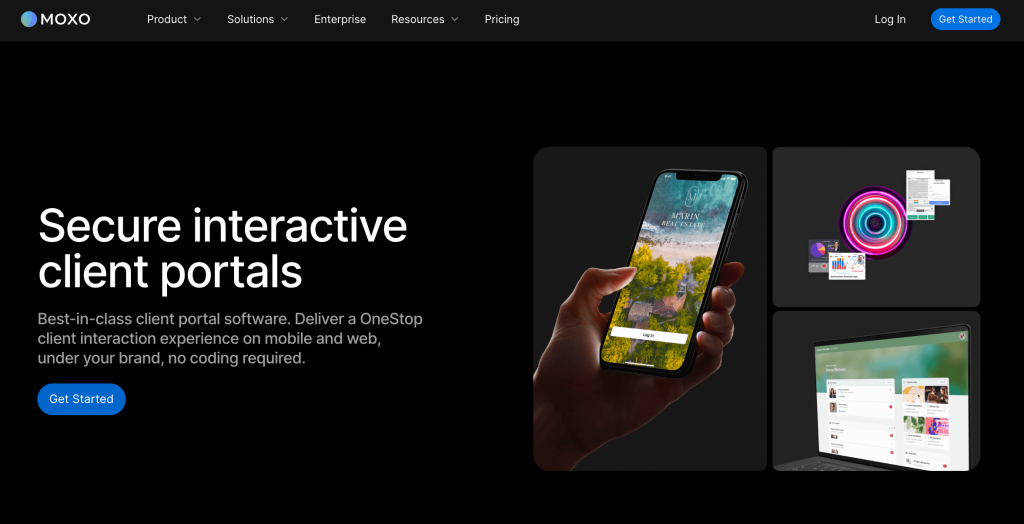
Incorporating a seamless blend of collaboration tools, Moxo introduces a OneStop Portal for businesses across various industries. Swift document sharing, contract handling, and digital signatures enable seamless client interactions across distances.
Moxo’s suite reveals a treasure of tools designed to enhance productivity. Users can easily switch between messaging, video meetings, and annotations. Its eSignature, Workflow Builder, and Universal Search make requests and approvals easy.
Pros:
- Great file and screen sharing.
- The free version is robust despite limitations.
- Everything is centralized under one roof.
- Incorporates effective screen sharing.
Cons:
- Some found it counterintuitive.
- Intermittent technical issues.
- Inconsistent customer support.
- The app flow may lack flexibility for users.
Pricing:
- Free Trial (90 days)
- Starter: $100
- Business: $480
- Advanced: Contact Sales
Customer Ratings:
- G2: 4.5 out 5 (122 reviews)
- Capterra: 4.1 out 5 (16 reviews)
Related: 10 Best Moxo Alternatives
8. Aligned
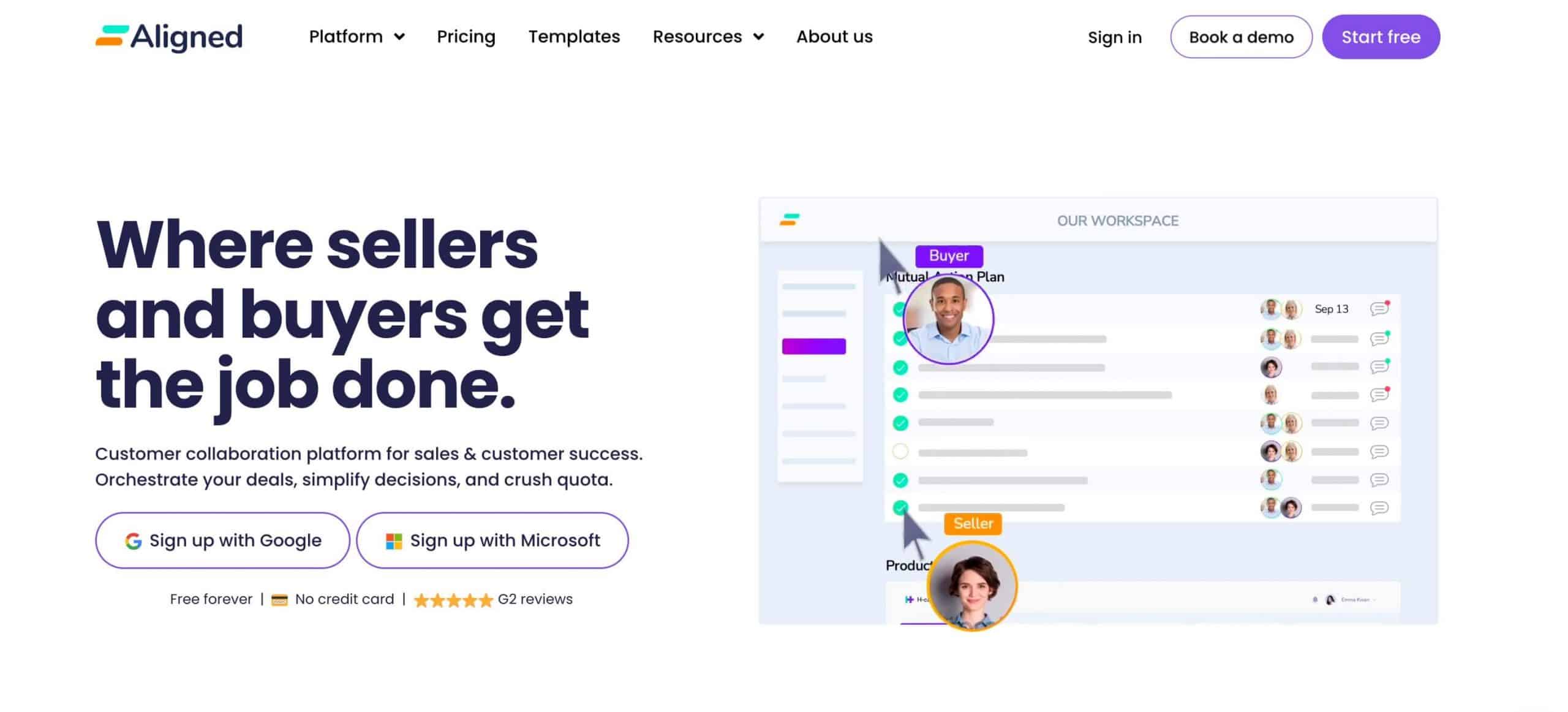
A game-changer in customer engagement, Aligned pioneers a digital sales room experience. It simplifies the buyer’s journey by consolidating all deal information in one place, eliminating scattered data across channels.
The key to Aligned’s appeal is its central operational hub, an efficient hub for collaborating with prospects. It’s the perfect space to share pivotal documentation, highlight essential dates, and resolve arising questions.
Pros:
- Offers a central hub for seamless collaboration.
- Immediate updates for fresh stakeholders.
- Bypasses the need for email threads.
- Designed for user-friendly interactions.
- Stellar customer support responsiveness.
Cons:
- It can cause slow computer performance.
- Pricing may seem steep for some.
- It may not cater to micro-businesses.
- The initial learning curve for some users.
- Room for more customization options.
Pricing:
- Free Version
- Basic: $29
- Pro: $49
- Enterprise: Contact Sales
Customer Ratings:
- G2: 4.8 out 5 (209 reviews)
- Capterra: 5 out 5 (47 reviews)
9. Clinked
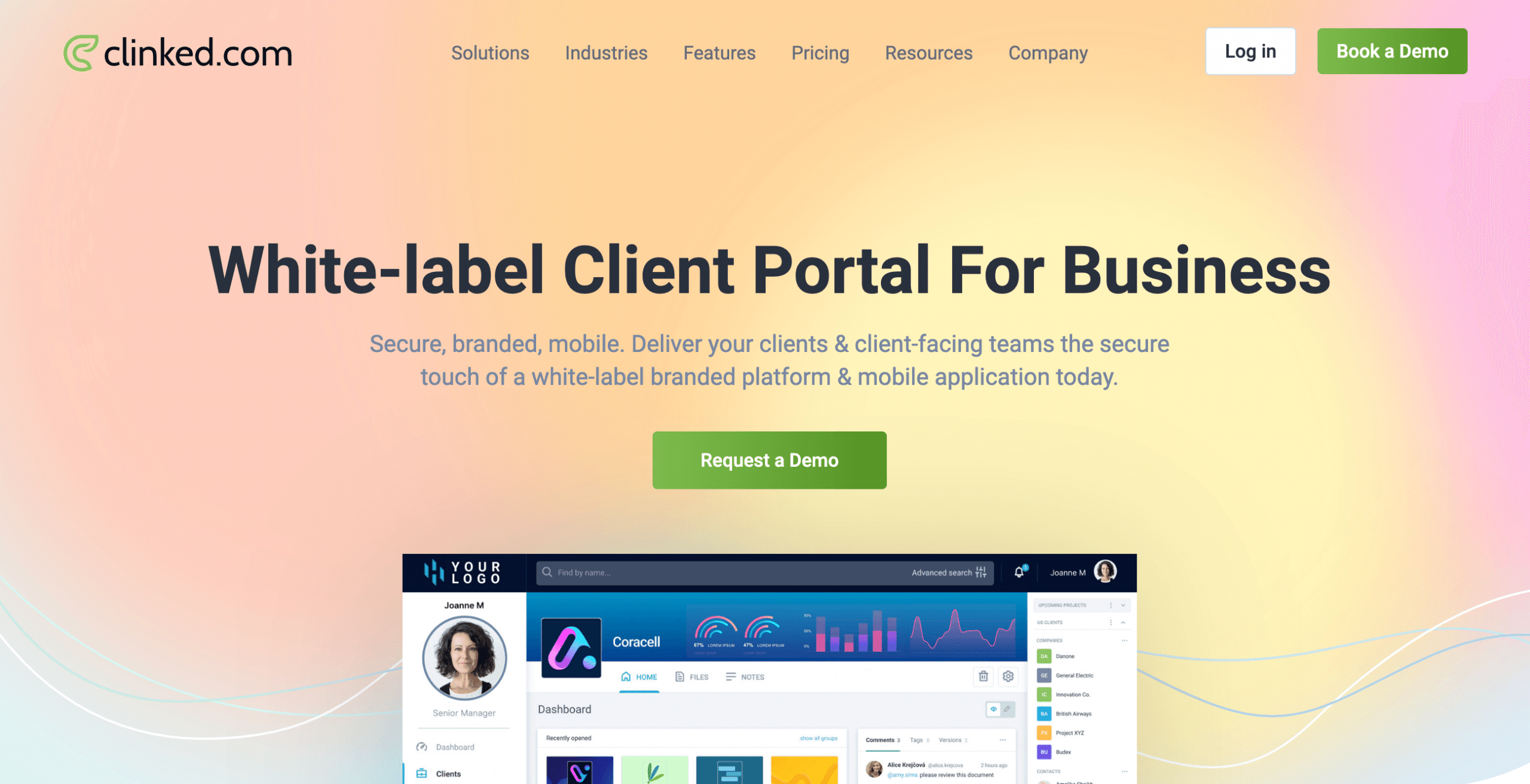
Clinked provides a secure client portal solution for global teams to collaborate on documents. Rooted in a cloud-based environment, it offers seamless interconnectivity with Zapier, Jotform, and Google Workspace.
Users appreciate Clinked’s task coordination potency, making it easier to manage progress and milestones. The visually-enticing interface, paired with intuitive navigation, ensures easy use.
In addition, the audit trails track employees comprehensively for transparency, while the group chat fosters team communication.
Pros:
- Workplaces tailored for each customer.
- Clean and organized interface.
- Easily integrates with external service software or websites.
- Quick and hassle-free setup process
Cons:
- The firewall rejects some client emails.
- Not all groups get full task options.
- Need to upgrade for more task functionalities.
- Absence of a spell-check feature.
Pricing:
- Free Trial (10 days)
- Lite: $95
- Standard: $239
- Premium: $479
- Enterprise: Contact Sales
Customer Ratings:
- G2: 4.7 out 5 (67 reviews)
- Capterra: 4.8 out 5 (63 reviews)
Related: 11 Best Clinked Alternatives
10. Dock
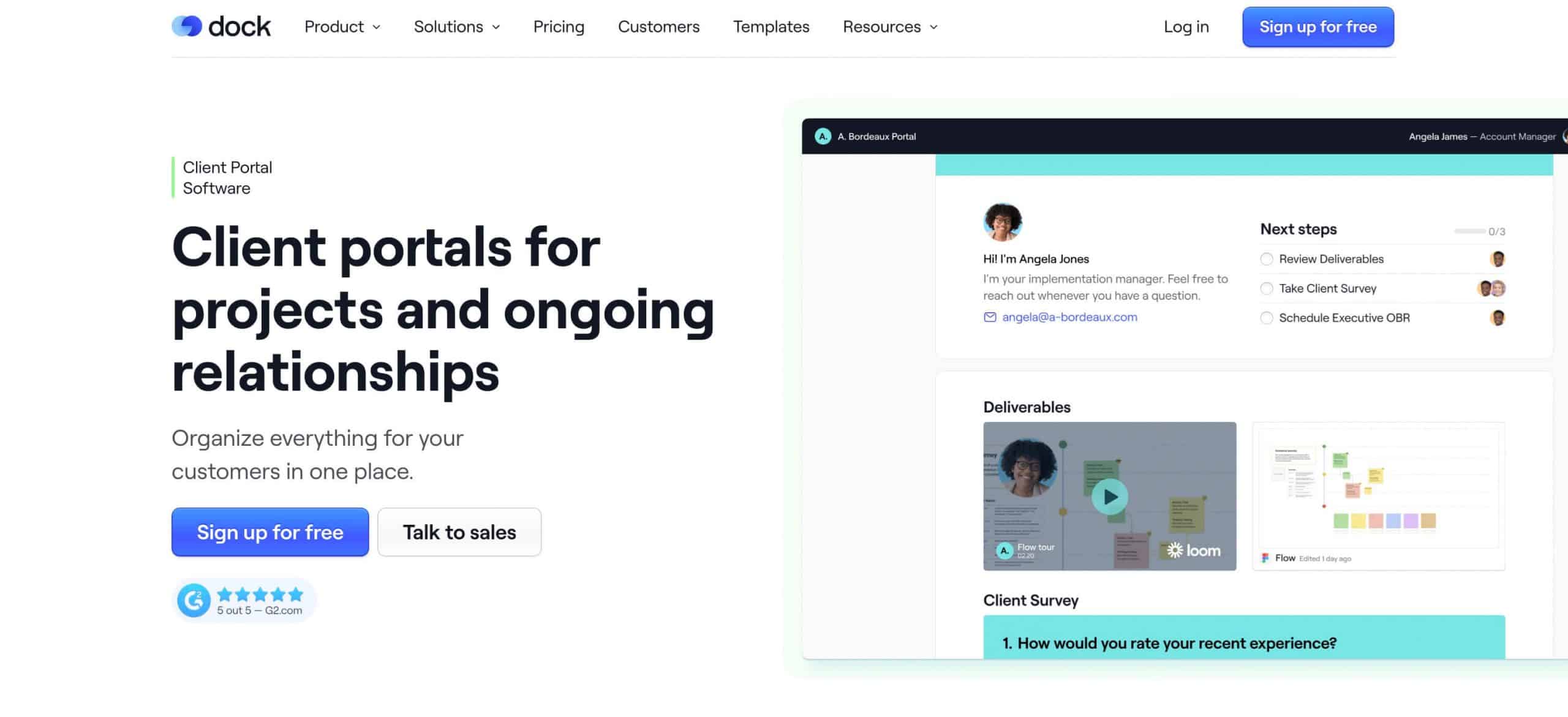
Dock is tailor-made for teams and project managers eager to centralize customer interactions. This platform offers a seamless experience, from setting up digital sales rooms to organizing client hubs. All messages and attachments are organized and easy to find.
Administrators are provided with tools to create personalized portals to share project plans and training videos. With Dock, tracking customer engagement and safeguarding client data has always been challenging.
Pros:
- Visually appealing and clear progress outlines.
- Easily shared with customers.
- Intuitive with multi-page workspaces.
- Feature-rich, even for embedding resources.
- Responsive customer support.
Cons:
- Missing option to share links to specific sections.
- Some core functionalities are missing.
- Minor clunky design elements.
- Requires logging in every time the software is accessed.
Pricing:
- Free Trial (14 days)
- Business: $49
- Enterprise: Contact Sales
Customer Ratings:
- G2: 4.9 out 5 (92 reviews)
- Capterra: No available ratings yet
11. EverAfter
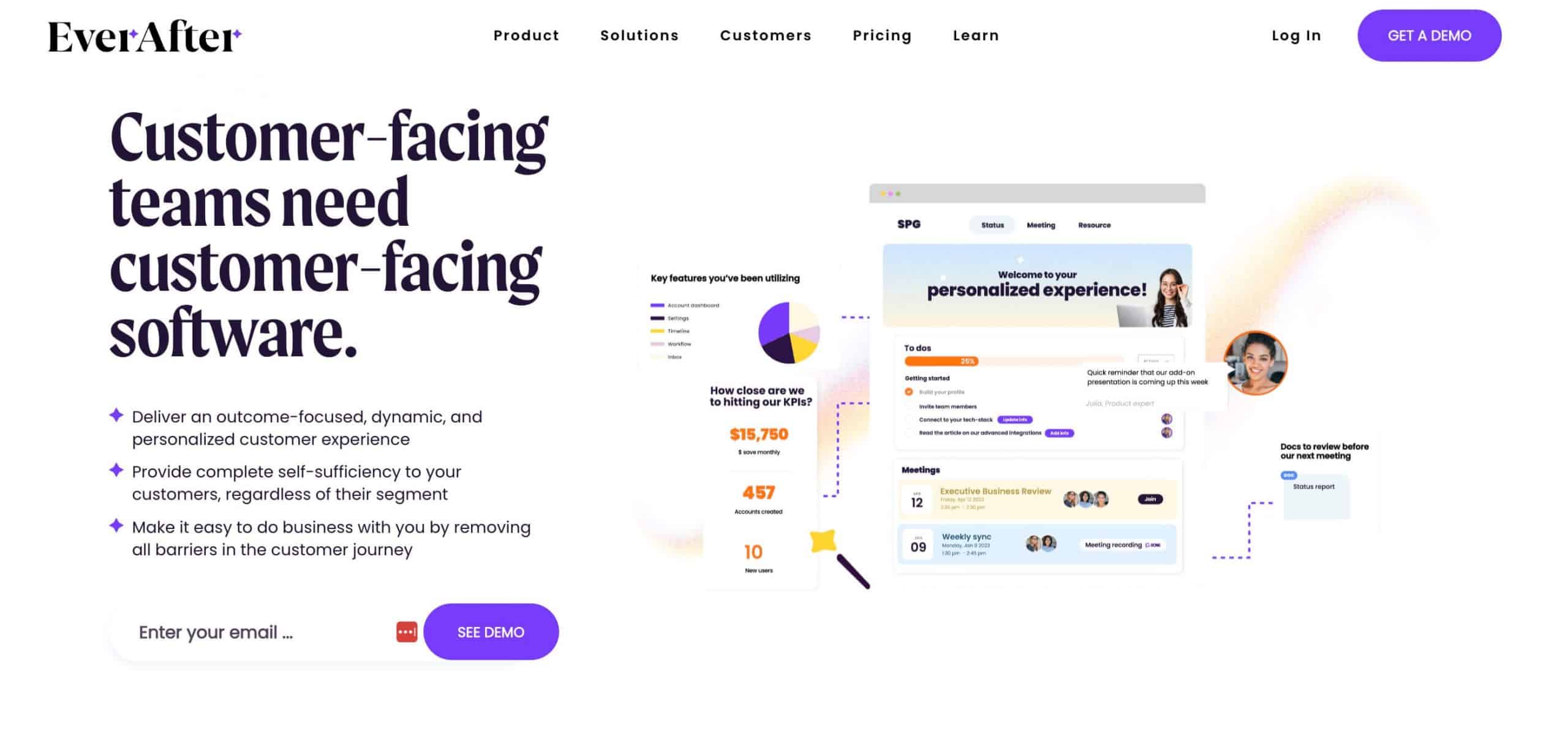
EverAfter specializes in creating a personalized customer portal that helps businesses enhance interactions with clientele while reducing application overload. Users can create a custom self-service hub using no-code building blocks to offer tailored information to clients.
Admins can decide what each user sees, from task updates to invoice details, and utilize the analytics for insights on content consumption. It even doubles up as an interactive tool during client meetings, cementing its place as an essential tool for modern businesses.
Pros:
- Customizable, aesthetically pleasing hub.
- Superior UI/UX, surpassing typical project tools.
- Eliminates the need for creating separate websites.
- Streamlines client updates and communication.
Cons:
- The steep learning curve for full-feature use.
- Users express a desire for broader app integrations.
- Features to create dependencies need to be included.
- Clunky permission controls for the Agency plan.
Pricing:
- Free Demo (Contact Sales)
- Business: Contact Sales
- Enterprise: Contact Sales
Customer Ratings:
- G2: 4.6 out 5 (79 reviews)
- Capterra: No available ratings yet
12. SuperOkay
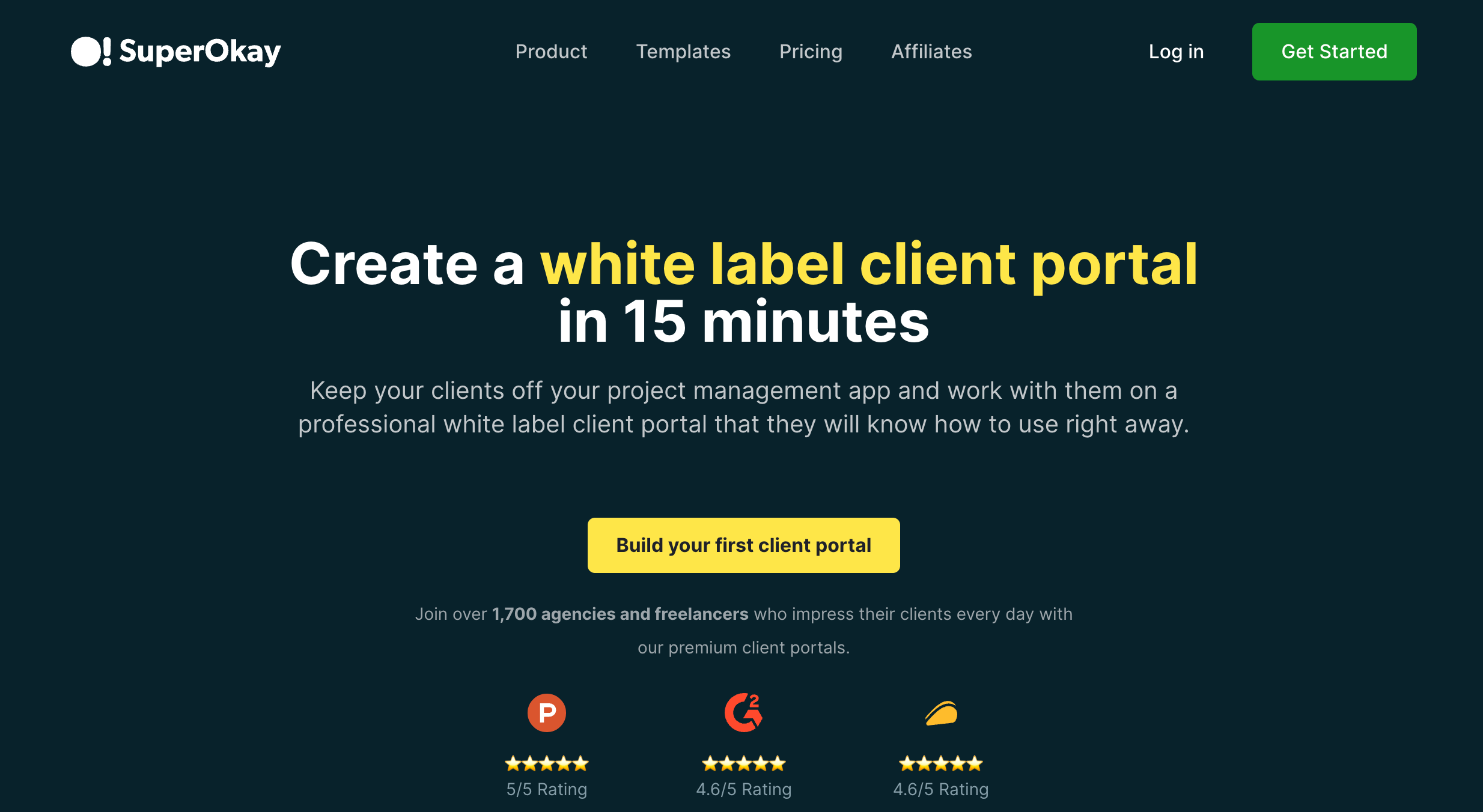
SuperOkay offers a myriad of features tailored to enhance collaboration and efficiency. Professionals seeking seamless operations benefit from its adaptability for internal and external communication. Users can benefit from a white-labeled domain and support with popular tools like Airtable and Trello.
By centralizing essential project details and assets, SuperOkay streamlines processes in fields like marketing, design, and development. The document editor includes interactive modules, such as pricing tables and reusable blocks, to improve efficiency.
Pros:
- Efficient file-sharing and client interaction.
- Continually evolving with a receptive support team.
- Brand-centric customization.
- Connects with external tools.
- Support for multiple languages.
Cons:
- Occasional glitches with folder structures.
- Restrictions on certain customization features.
- Reliance on one-time links for user login.
- Some competitors have more advanced options.
Pricing:
- Free Version
- Solo: $19
- Solo+: $59
- Business: $112
Customer Ratings:
- G2: 4.6 out 5 (38 reviews)
- Capterra: 4.8 out 5 (9 reviews)
13. Onehub
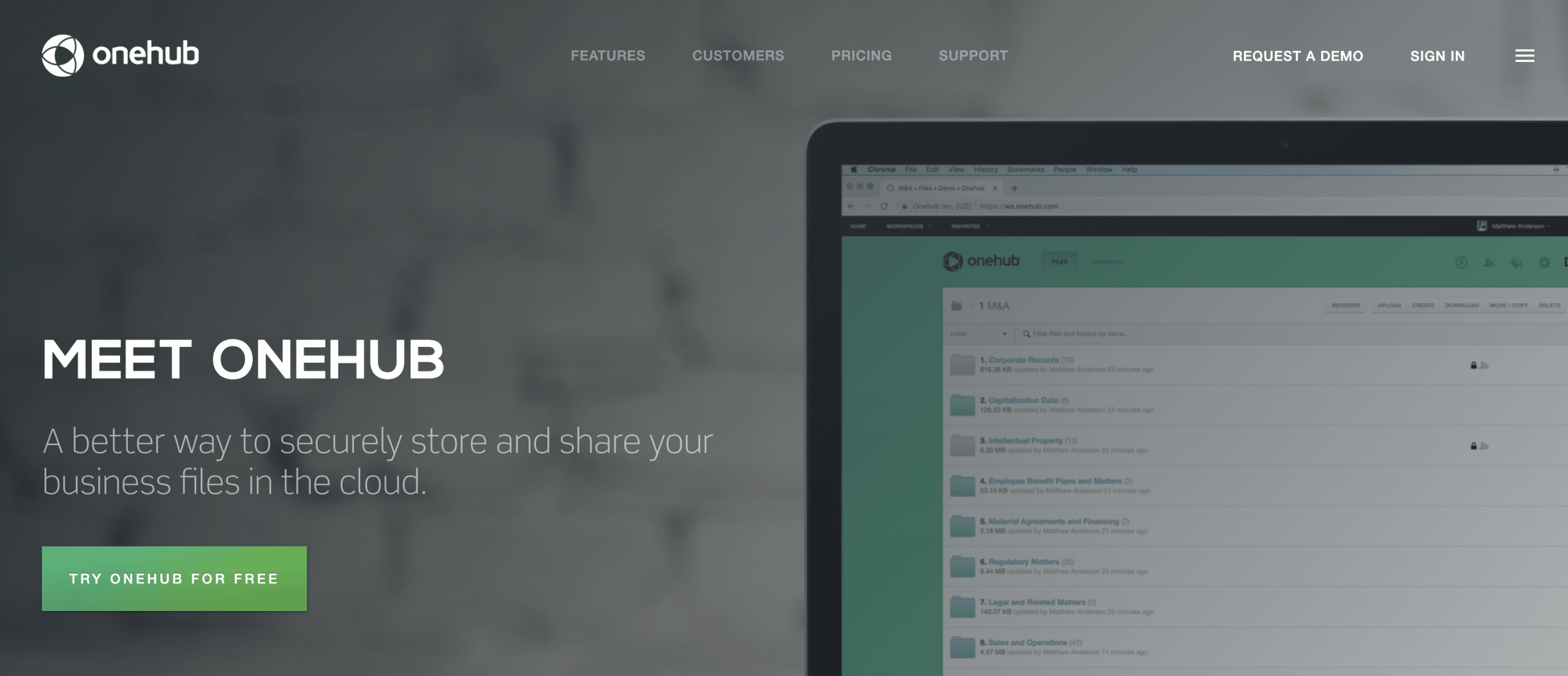
Onehub provides secure file storage and sharing for businesses with bank-level encryption. Taking it a notch higher, Onehub enhances the professional look by allowing customization of workstations and creating tailored customer hubs.
Diving into its features, Onehub shines with its virtual data rooms, ensuring paramount security for critical transactions. Integration with Google Docs, automatic watermarking, and workrooms further refine the sharing experience.
Pros:
- Competitive features at an affordable rate.
- Intuitive use for professionals and clients.
- Versatile from essential storage to data rooms.
- Simplified setup and user appointment.
Cons:
- Limited functions compared to cost.
- Occasional access issues via work emails.
- Link-based access can be convoluted.
- Rare delays in document processing.
Pricing:
- Free Trial (14 days)
- Standard: $15
- Advanced: $25
- Data Room Edition: $375
- Unlimited Edition: $575
Customer Ratings:
- G2: 4.2 out 5 (45 reviews)
- Capterra: 4.5 out 5 (33 reviews)
14. Clustdoc
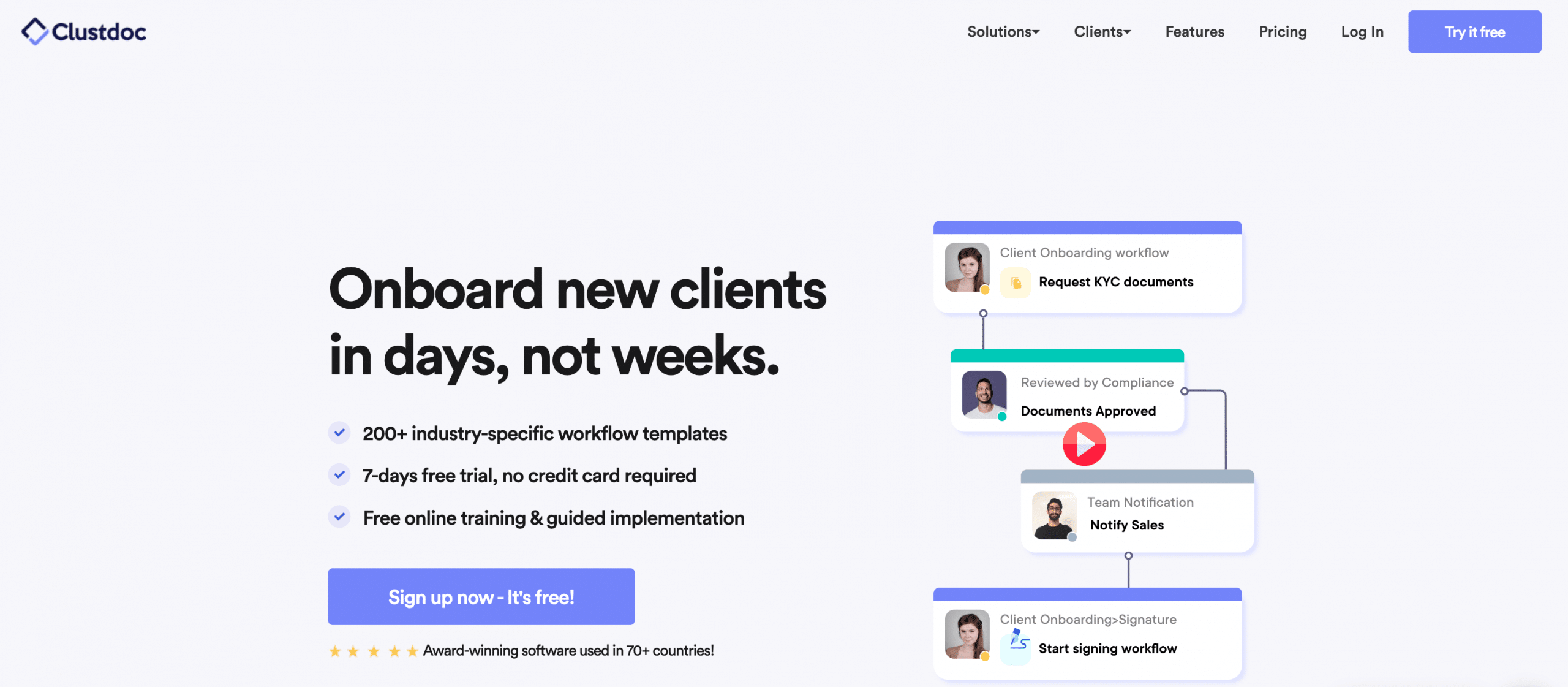
Built for contemporary teams, Clustdoc offers an efficient solution for those repetitive industry-specific chores. Instead of scattering data across various platforms, this unified software serves as a hub to solicit, gather, and assess client data, documents, and more.
Highlighting its robust suite of features, Clustdoc stands out with its customized hubs and comprehensive task management. The platform simplifies client-centric processes by offering features like setting due dates, credit card payments, and electronic signatures.
Pros:
- Has excellent features for welcoming clients into the platform.
- Continual improvement with regular updates.
- Top-notch support, especially for European timings.
Cons:
- Some features need to be updated.
- Form field adjustments can be tedious.
- The initial learning curve can be steep.
- Lacks granular customization for forms.
- Some field options are limited.
Pricing:
- Free Trial (7 Days)
- Gold: $100
- Platinum: $350
- Enterprise: Contact Sales
Customer Ratings:
- G2: 4.0 out 5 (12 reviews)
- Capterra: 4.7 out 5 (62 reviews)
Frequently Asked Questions
As a business owner, many questions pop up when deciding on the right customer portal for your business. We’ve answered some of the biggest questions to help you choose the best features you need in a shiny new client portal hub.
How can a client portal benefit my business or organization?
Customer hubs are designed to enhance client relationships and improve operational efficiency. With these multi-faceted innovative tools, you can securely communicate and share information with your customers while enhancing your brand.
Another benefit that these tools offer is centralized communication and information. A single resource for truth and timely customer communication ensures the team is always on track with ongoing plans. The comprehensive feature set of these platforms can also lead to cost reduction and scalability.
Luckily, there are free client portal software options that users can capitalize on to test the water. With so many options in the market, businesses should meticulously test products to find the perfect fit.
How secure are client portal platforms for storing sensitive data?
When well-designed, customer portal software can provide robust security through strong SSL encryption, access control mechanisms, and secure hosting environments. These tools are engineered with security protocols to ensure data privacy and compliance with various regulatory standards.
Moreover, many customer hubs can integrate with project management software to facilitate secure collaboration and data sharing within a project context.
Can I customize the client portal to match my brand’s look and feel?
Yes, most client hubs allow customization to match your business identity. This ensures a consistent experience for every new client. White-label options enable you to give your client a personalized and professional interface. Partner it with a well-designed and user-friendly UI, and white label options can showcase your commitment to delivering high-quality services.
Can I integrate the client portal with other software I use in my business?
Yes, most products provide integration capabilities with other software solutions used in your business. This facilitates seamless data exchange and process automation between the customer hub and other systems, enhancing operational efficiency and providing a unified user experience.
Conclusion
Getting the best client portal software enables a business to gain a competitive advantage while fostering loyalty. Check out portal features first to ensure features align with your growth trajectory and operational requirements.
More customizable client portals often require premium plans, so sign up for free trials first to test components and confirm company fit.
Choose your fighter: free trials or freemium option? You have both options with Ahsuite. You can enjoy premium client portal features with Pro and Agency plans with a 30-day trial. Or get the free-forever Ahsuite Starter Plan, which offers free portals for up to 10 clients.

